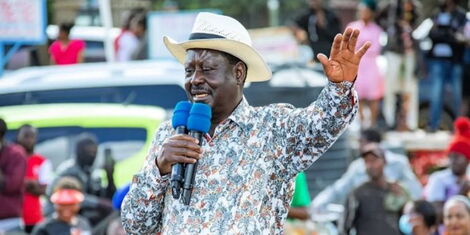-
Jubilee party Secretary General Jeremiah Kioni at a past press event. TWITTER JUBILEE PARTY
-
Jubilee Party has announced that it will join the planned countrywide rallies by Azmio One Kenya Coalition Party leader Raila Odinga if asked to.
Speaking on Monday, December 5, the party's Secretary General Jeremiah Kioni noted if required, the party members will join the public rallies scheduled to start on Wednesday, December 7.
According to Kioni, the former ruling party, along with other Azimio coalition parties, are awaiting a directive from Odinga on the details of the meeting.
 Azimio Party leader Raila Odinga during a rally in Utawala on Sunday, December 4, 2022. RAILA ODINGA
Azimio Party leader Raila Odinga during a rally in Utawala on Sunday, December 4, 2022. RAILA ODINGA“If it is a rally that we will need to attend as members of the opposition then we will attend. I am sure we will get communication from Raila Odinga,” Kioni indicated during an interview with Spice FM.
Kioni also stated that he was going to reach out to Odinga to obtain the details of when the rally will take place and the coalition's plan going forward.
This is a change of tact by the former President Uhuru Kenyatta's party considering that it had indicated on Saturday, December 3, that it was not going to participate in Odinga's demonstrations.
In a statement, the Jubilee SG had clarified that the former ruling party would not participate in Odinga’s rallies scheduled to start at the Kamukunji Grounds in Nairobi.
In addition, Kioni praised Raila’s intention to mobilize opposition to Ruto’s administration, stating that protests is a critical tool available to the opposition, which the opposition chief is effectively using.
“Protesting is a tool that is available to the opposition and they should use it when they think it is appropriate. It is also provided for in the constitution,” he indicated.
Odinga rallied his followers for a gathering on Wednesday, December 7 to discuss how to hold the Kenya Kwanza government accountable.
He maintained, Azimio will hold their first rally at Kamukunji grounds in Nairobi before proceeding to Mombasa, then Nakuru and Kakamega counties.
President William Ruto on Sunday, December 4 directed Interior Cabinet Secretary Kithure Kindiki to provide security to the opposition during their protests.
 Interior Cabinet Secretary Prof Kindiki Kithure during a security meeting in Wajir County on November 24, 2022. MINISTRY OF INTERIOR By Denbis Shisia, Kenyans.co.ke
Interior Cabinet Secretary Prof Kindiki Kithure during a security meeting in Wajir County on November 24, 2022. MINISTRY OF INTERIOR By Denbis Shisia, Kenyans.co.ke






